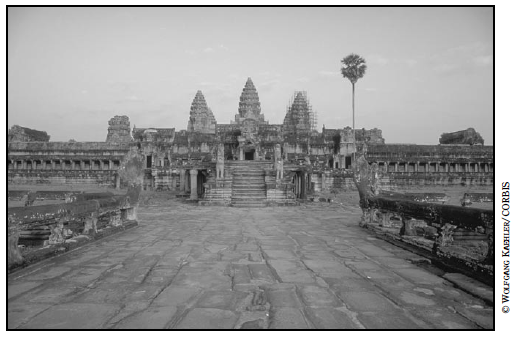AP world history unit 1
1/23
There's no tags or description
Looks like no tags are added yet.
Name | Mastery | Learn | Test | Matching | Spaced |
|---|
No study sessions yet.
24 Terms
Which of the following was an important continuity in the social structure of states and empires in the period 600 B.C.E. to 1450 C.E.?
Landholding aristocracies tended to be the dominant class
The founder of Buddhism developed a religion centered on
Elimination of desire and suffering
All of the following were part of the Confucian social order EXCEPT
Chastity by husbands (chastity - decency, modesty)
The Chinese concept “Mandate of Heaven” was sometimes used to justify
Rebellion

The photograph above of Angkor Wat in Cambodia is an example of
Hindu influence in Southeast Asia
Which of the following is a key philosophical and religious element of Daoism?
Emphasis on harmony between humanity and nature
I am imperishable time;
The Creator whose face is everywhere;
Death that devours all things;
The source of all things to come
The god Krishna speaks, Bhagavad Gita, Vedic sacred text, circa fifth century to second century B.C.E.
The excerpt above best represents which aspect of Hinduism?
The cyclical nature of death and rebirth
Based on the maps and your knowledge of world history, which of the following best describes the effect of the spread of Islam on Indian Ocean trade?
It led to the expansion and intensification of commerce along already existing trade routes
Judaism, Christianity, and Islam share which of the following?
They recognize the existence of Adam and Moses
The author’s claim in the second paragraph that Asian countries such as India, Japan, and Thailand, have certain cultural characteristics “in common possession” is most likely a reference to which of the following?
Shared Buddhist religious influences
“The commercial area of the capital extends from the old Qing River market to the Southern Commons and to the city border on the north. . . . Some famous fabric stores sell exquisite brocade fabric and fine silk, which are unsurpassed elsewhere in the country. . . . Most other cities can only boast of one special product; what makes the capital unique is that it gathers goods from all places. Furthermore, because of the large population and the busy commercial traffic, there is a demand for everything.”
Description of Hangzhou, capital of the southern Song dynasty, circa 1235 C.E.
Which of the following assertions in the description of Hangzhou above would be most difficult to verify?
That the merchandise sold in Hangzhou was of higher quality than that sold in other Chinese cities
From the founding of each religion, Christians and Muslims shared a belief in
A single omnipotent deity
“Emperor Zhengzong, being deeply concerned with agriculture, came to know that the Champa rice was drought resistant and that the green lentils of India were famous for their heavy yield and large seeds. Special envoys, bringing precious things, were dispatched with a view to securing these varieties.... When the first harvests were reaped in the autumn, the emperor called his closest ministers to taste them and compose poems for Champa rice and Indian green lentils.”
Shu Wenying, Buddhist monk, China, eleventh century C.E.
Which of the following made possible the Chinese cultivation of the staple crops described in the passage?
The intensification of regional trade in East and South Asia
“Emperor Zhengzong, being deeply concerned with agriculture, came to know that the Champa rice was drought resistant and that the green lentils of India were famous for their heavy yield and large seeds. Special envoys, bringing precious things, were dispatched with a view to securing these varieties.... When the first harvests were reaped in the autumn, the emperor called his closest ministers to taste them and compose poems for Champa rice and Indian green lentils.”
Shu Wenying, Buddhist monk, China, eleventh century C.E.
The activities of the state described in the passage are consistent with which of the following Song dynasty policies?